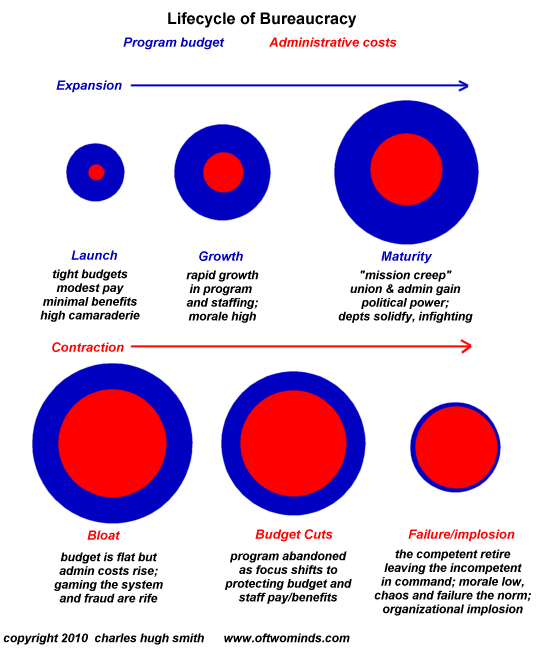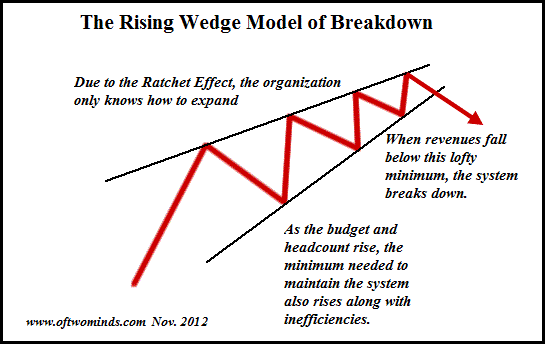by Charles Hugh Smith
Why is our government so incompetent? Short answer: because incompetence has been fully institutionalized in every branch, every agency and every nook and cranny of the state.
Though many may reckon the U.S. government (and its Deep State) are not so much incompetent as merely evil, I suggest incompetence sows the seeds of evil consequences.
It's easy to lay the responsibility for the state's incompetence on its staggering size and complexity, and there is much truth in the notion that no system of this scale and complexity can possibly be governable or accountable.
But I think we owe it to ourselves to dig a bit deeper than this to understand why our visible government (executive, Congress, regulatory agencies, the Federal Reserve, etc.) and the Deep State (everything that's decided and run behind closed doors) is so monumentally incompetent.
The policies and decisions of the past 15 years can be reduced to three catastrophic blunders: the discretionary war in Iraq and "nation-building" in Afghanistan; allowing those responsible for the 2008 financial meltdown to become even more invulnerable and predatory, i.e. enabling a "too big to fail" banking sector, and Obamacare, the Orwellian-named Affordable Care Act (ACA).
Each of these policy decisions has been enormously destructive to the nation, and the opportunities lost in their wake are irreversible.
I have covered the systemic reasons for incompetence and failure many times.These boil down to the accumulating sclerosis of bureaucracy and the ratchet effect.
I have addressed The Lifecycle of Bureaucracy on a number of occasions: 
Our Legacy Systems: Dysfunctional, Unreformable (July 1, 2013)
The Way Forward (April 25, 2013)
When Escape from a Previously Successful Model Is Impossible (November 29, 2012)
Complexity: Bureaucratic (Death Spiral) and Self-Organizing (Sustainable) (February 17, 2011)
The ratchet effect can also be visualized as a rising wedge, in which costs and inefficiencies continue rising until any slight decrease in funding collapses the organization.
Dislocations Ahead: The Ratchet Effect, Stick-Slip and QE3 (February 14, 2011)
The Ratchet Effect: Fiefdom Bloat and Resistance to Declining Incomes (August 23, 2010) 
I think we can add a few other factors:
1. That which is cheap and abundant will be squandered until it is no longer cheap or abundant. Our default programming is to squander what is easily available and abundant. This is true not just of resources such as food and energy but of health, trust, power and all sorts of other intangibles.
For example, when the Soviet Union collapsed, the U.S. was left with an abundance of soft and hard power on the global stage. The natural response was to squander it on misadventures instead of investing it wisely.
When we're young and healthy, we squander this reservoir of vitality rather than invest it wisely in habits that will maintain our health as we age.
There are countless examples of this dynamic. The irony of this dynamic is tragic: by the time we realize we've squandered an irreplaceable resource, it's too late.
2. The prime directive of any bureaucracy is to eliminate all accountability. The raison d'etre of bureaucracy, the very reason for its existence, is not to manage complex affairs but to dissipate accountability into a formless cloud so that no member of the bureaucracy will ever face any consequences for his/her actions.
In other words, the prime directive of any bureaucracy is to enforce the perfection of moral hazard, i.e. those making decisions suffer no consequences when the decisions are disastrous.
The entire structure of a bureaucracy boils down to this: we followed the rules, and therefore we are blameless.
Obamacare and the Pentagon are both perfections of this purposeful loss of accountability. I recently saw a video clip of a journalist who had asked 12 different government functionaries who was in charge of implementing the Obamacare website before its flawed launch and he'd received 12 different answers.
In other words, accountability had already been extinguished well before the site was even launched.
3. Bureaucracies are intrinsically prone to group-think. The more closed the bureaucracy, the greater this tendency to eliminate skeptics, heretics, independent thinkers, etc.: Who Gets Thrown Under the Bus in the Next Financial Crisis? (March 3, 2014).
The foundational group-think concepts behind each of the three policy disasters listed above have all been discredited, but only after group-think insured the destruction of vital national interests: for example, the neo-conservative "failed-state" concept that guided a decade of foreign policy misadventures: The Rise and Fall of the Failed-State Paradigm: Requiem for a Decade of Distraction (Foreign Affairs).
4. As correspondent Lew G. has pointed out, bureaucracies are not designed to be fail-safe; their complexity and lack of accountability lead not to resilience but to fragility and vulnerability.
5. One systems-level consequence of tightly connected, interactive complex systems is that they generate routinely failures known as "normal accidents," catastrophes that result from seemingly small miscalculations and miscues that cascade into systemic crises. When accountability has been lost, there are no feedback loops left to correct these "normal accidents," so the damage piles up within the organization until it collapses in a supernova model of accumulated incompetence.
6. The moral-hazard-riddled leadership of bureaucracies will choose whatever short-term politically expedient fix reduces the immediate political pain (also known as "kicking the can down the road") rather than risk shaking up the organization by imposing accountability and clearing out the deadwood. This dependence on short-term politically expedient "fixes" that ignore the real problems piles up more moral hazard, failed policies, ineffective deadwood and cost, increasing the system's fragility and vulnerability to any shock that cannot be dissolved with another short-term can-kicking "fix."
Why is our government so incompetent? Short answer: because incompetence has been fully institutionalized in every branch, every agency and every nook and cranny of both the visible state and the Deep State.
ADMIN. NOTE: Dwolla donor Stuart L., please email me so I can begin your weekly Musings Reports subscription. Thank you.
No comments:
Post a Comment